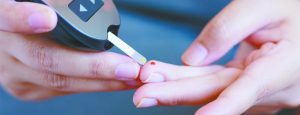 Alcohol acutely blocks the production of glucose in the liver, so drinking alcohol can cause a dangerous drop in blood glucose. If your blood glucose drops too much, the liver may not be able to use its stored glucose to raise your blood glucose level.
Alcohol acutely blocks the production of glucose in the liver, so drinking alcohol can cause a dangerous drop in blood glucose. If your blood glucose drops too much, the liver may not be able to use its stored glucose to raise your blood glucose level.
The danger for people with diabetes is that if they drink excessively, their liver’s ability to balance glucose production is impaired. Chronic use of alcohol contributes to higher glucose levels because of the additional calories, increased body weight and its potential effects on insulin sensitivity.
We all know the guidelines of the healthy version of drinking. A glass of wine or liquor for women and two for men is usually the allotted daily amount recommended for the health benefits to transpire. Despite the health claims of moderate drinking, not everyone should drink. Do not drink if you can’t control your intake or abuse alcohol, are pregnant or trying to become pregnant, take medications that interact with alcohol, have a medical condition that alcohol effects negatively, or if you plan to operate machinery or drive a vehicle.
In diabetics and non-diabetics alike, alcohol plays a significant role in our bodies overall health. A full 24 hours after an episode of drinking, your immune system is more susceptible to disease and infection. Your brain can be severely affected by alcohol. Have you ever woken up dizzy, with a headache, unable to remember everything that happened the night before? This is due to the adverse effect that alcohol has on our brains. The neurons and neurotransmitters in the brain are responsible for a multitude of functions from memory recall, motor senses, to movement and coordination. These tiny pathways and transmitters can show both short-term and long-term damage after binging or prolonged alcohol use.
Because the liver removes toxins, including those from drinking alcohol, it can be overworked and stressed. If you have diabetes, it’s important to test your blood sugar levels before, during and after consuming alcohol.
The functions that are damaged by alcohol abuse are often longstanding. If you stop drinking, some of the damage will lessen, or improve like problem-solving, memory recall, attention span, and motor functions, but this will take time. Researchers usually see improvements to the brain after several months or years after abstinence takes place.
Along with diabetic complications, drinking can increase your risk of certain cancers, like breast cancer, oral, esophageal, liver and throat cancer. It also harms the blood vessels in your pancreas, which inhibits digestion and damages the liver. The livers of alcoholics usually develop fatty deposits known as fatty liver disease. These implications can contribute to more severe disorders like cirrhosis or fibrosis of the liver.
Heavy drinking also damages the heart, which can lead to heart palpitations and irregular beating, high blood pressure, heart attack, stroke, and cardiomyopathy, since diabetics are at high risk of cardiovascular disease, it’s imperative to take caution before consuming alcohol.
To schedule an appointment, please call 352.274.9900, or visit their website at gotomhc.com
April is Alcohol Awareness Month, and the National Council on Alcohol and Drug Dependence shines a light on the first weekend in April every year as the weekend of abstinence. If you have trouble avoiding alcohol for those three days, they encourage you to speak to your physician or therapist about getting help.
With careful planning, you can control your diabetes in any situation. The endocrinology team at SupER Urgent care’s mission is to provide you with high quality medical services and compassionate care. They will coordinate your visit with your primary care physician.
(1). Diabetes.org, 2018, Adapted from the book Diabetes Meal Planning Made Easy, 4th Edition, written by Hope S. Warshaw, MMSc, RD, CDE, a nationally recognized expert on healthy eating and diabetes.
Tips from The American
Diabetes Association:
• If you have diabetes, do not drink on an empty stomach or when your blood glucose is low, since your risk of low blood glucose increases after drinking.
• If you choose to drink, follow the rules above and have it with food. This is mainly important for those on insulin and other diabetes pills that can lower blood glucose by making more insulin.
• Don’t skip a meal if you are going to drink. (If you use carbohydrate counting to plan meals, it is important to understand how the drinks you choose affect your blood glucose and often your insulin dose will need to be decreased if having more than one drink)
• Wear an I.D. that notes you have diabetes. If you are in a setting where people are drinking alcohol, hypoglycemia may be mistaken for being drunk.
• Watch out for craft beers, which can have twice the alcohol and calories as a light beer.
• For mixed drinks, choose calorie-free drink mixers like diet soda, club soda, diet tonic water or water.
• As with anyone with or without diabetes, do not drive or plan to drive for several hours after you drink alcohol. (1)
MHC ENDOCRINOLOGY CLINIC
1714 SW 17th St, Ocala, FL 34471
352.274.9455 | www.gotomhc.com
Check Also
Breaking Through the Pain: Innovative Shockwave Therapy Transforms Arthritis Treatment
By Gene Turner, MD, FAARFM Mid-Florida Age Management are highlighting breakthrough treatments that are changing …
 Central Florida Health and Wellness Magazine Health and Wellness Articles of the Villages
Central Florida Health and Wellness Magazine Health and Wellness Articles of the Villages


